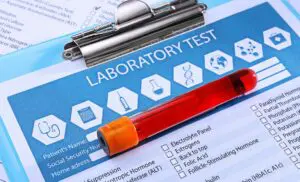Polycystic Ovary Syndrome (PCOS) is a common hormonal disorder that affects individuals with ovaries, often leading to irregular menstrual cycles, ovulatory dysfunction, and increased androgen levels. One characteristic marker of PCOS is high Anti-Müllerian Hormone (AMH) levels. In this blog, we’ll explore the significance of high AMH levels in the context of PCOS and delve into effective treatment strategies.
Contents
What Is AMH?
Anti-Müllerian Hormone (AMH) is a hormone produced by the cells in the ovarian follicles, structures within the ovaries that contain developing eggs. AMH plays a crucial role in regulating the growth and development of eggs in the ovaries. The levels of AMH are often measured to assess a woman’s ovarian reserve, indicating the quantity of eggs remaining. High levels of AMH are commonly due to conditions such as Polycystic Ovary Syndrome (PCOS), where multiple small cysts form on the ovaries.
In the context of fertility and reproductive health, AMH testing provides valuable insights into ovarian function and can help guide treatment decisions, particularly in cases of infertility or hormonal disorders. Understanding AMH levels is an important aspect of assessing and managing reproductive health concerns in individuals with ovaries.
Other Impacts Of High AMH Levels
While Anti-Müllerian Hormone (AMH) is primarily associated with ovarian function and reproductive health, elevated AMH levels may have broader implications beyond fertility. Here are some potential impacts of high AMH levels:
- Ovulatory Dysfunction: High AMH levels may contribute to disruptions in the ovulatory process, leading to irregular or absent menstrual cycles. Ovulatory dysfunction can affect fertility and may lead to conditions such as PCOS.
- Increased Androgen Levels: AMH is produced by ovarian granulosa cells, and high levels may be associated with increased androgen (male hormone) production. This can contribute to symptoms such as acne, hirsutism (excessive hair growth), and male-pattern baldness in individuals with PCOS.
- Ovarian Hyperstimulation Syndrome (OHSS): In the context of assisted reproductive technologies like in vitro fertilization (IVF), administering medications to stimulate egg production can also lead to excessively high AMH levels and increase the risk of ovarian hyperstimulation syndrome. This condition involves the enlargement of the ovaries and fluid accumulation in the abdominal cavity.
- Potential Cardiovascular Implications: Some studies suggest a potential association between high AMH levels and an increased risk of cardiovascular issues. However, more research is needed to establish a clear link, and the mechanisms underlying this association are not fully understood.
- Bone Health: Elevated AMH levels have been associated with decreased bone mineral density in some studies. The impact of AMH on bone health is an area of ongoing research, and the relationship is complex.
Treatment Approaches For PCOS When AMH Levels Are High
When dealing with Polycystic Ovary Syndrome (PCOS) accompanied by elevated Anti-Müllerian Hormone (AMH) levels, treatment approaches aim to address hormonal imbalances, regulate ovulation, and manage associated symptoms. Here are some common treatment strategies:
- Ovulation-Inducing Medications: These medications are often the first line of treatment for individuals with PCOS experiencing ovulatory issues. Clomiphene and Letrozole work by stimulating the ovaries to produce more eggs, increasing the chances of successful ovulation. This can be particularly beneficial in regulating menstrual cycles and addressing fertility concerns associated with high AMH levels.
- Inositol Supplements: Inositol, a naturally occurring compound, has shown promise in improving insulin sensitivity and ovarian function in women with PCOS. By positively influencing insulin levels, inositol supplements may contribute to the regulation of AMH levels and support overall reproductive health. These supplements are well-tolerated and are often considered a complementary approach to standard treatments.
- Metformin: Metformin is an oral medication commonly prescribed for individuals with PCOS, particularly those with insulin resistance. By improving the body’s response to insulin, Metformin helps regulate hormonal imbalances associated with high AMH levels.
- In Vitro Fertilization (IVF): IVF is a more advanced reproductive technology that may be considered when other treatments are unsuccessful. It involves stimulating the ovaries to produce multiple eggs, retrieving the eggs, fertilizing them in a laboratory, and then transferring embryos to the uterus. IVF increases the likelihood of successful conception and is a viable option for those with PCOS and high AMH levels facing fertility challenges.
- Ovarian Drilling: Ovarian drilling is a minimally invasive surgical procedure that involves making small holes in the ovaries. This technique aims to reduce the production of androgens and enhance ovulation. While less common due to the availability of other effective treatments, ovarian drilling may be an option in specific cases.
Natural Ways To Reduce AMH Levels
Reducing Anti-Müllerian Hormone (AMH) levels naturally involves lifestyle modifications and dietary changes. Here are some natural ways to potentially reduce AMH levels:
- Healthy Diet: Adopt a balanced diet rich in whole foods, including fruits, vegetables, lean proteins, and whole grains. Focus on foods that support hormonal balance, such as those high in antioxidants and essential nutrients.
- Regular Exercise: Engage in regular physical activity, as exercise has been shown to positively impact hormonal regulation. Both aerobic exercises and strength training can contribute to overall well-being and may indirectly influence AMH levels.
- Weight Management: Maintain a healthy weight, as excess body weight, especially abdominal fat, can contribute to hormonal imbalances. Weight management is crucial for individuals with conditions like Polycystic Ovary Syndrome (PCOS) due to elevated AMH levels.
- Omega-3 Fatty Acids: Incorporate foods rich in omega-3 fatty acids, such as fatty fish, flaxseeds, and walnuts, into your diet. Omega-3s have anti-inflammatory properties and may contribute to hormonal balance.
- Adequate Sleep: Prioritize sufficient and quality sleep, as sleep plays a crucial role in hormonal regulation. Aim for 7-9 hours of sleep per night to support overall well-being.
- Stress Management: Practice stress-reducing techniques, such as meditation, deep breathing exercises, or yoga. Chronic stress can impact hormonal balance, and managing stress levels may contribute to overall hormonal health.
- Limiting Processed Foods: Reduce the intake of processed foods, refined sugars, and excessive caffeine. These dietary factors can contribute to inflammation and may indirectly influence hormonal imbalances.
- Herbal Supplements: Some herbal supplements, such as spearmint tea, have been suggested to have anti-androgenic properties and may contribute to hormonal balance. However, it’s essential to consult with a healthcare professional before incorporating herbal supplements, as they may interact with medications or have contraindications.
Conclusion
In conclusion, navigating the complexities of high (AMH) levels and their association with PCOS demands a nuanced and personalized approach. As we’ve explored the various treatment strategies, from lifestyle modifications to medications it’s evident that there isn’t a one-size-fits-all solution. Instead, effective management requires a thorough understanding of the individual’s health, unique circumstances, and treatment response.
Every individual’s path is unique, and by combining medical expertise with personalized strategies, we empower those facing these challenges to navigate their journey with resilience, confidence, and the potential for positive outcomes.
If you are facing PCOS-related issues, PCOS treatment at HerMantra can help. Book your free trial online pcos treatment session now.




